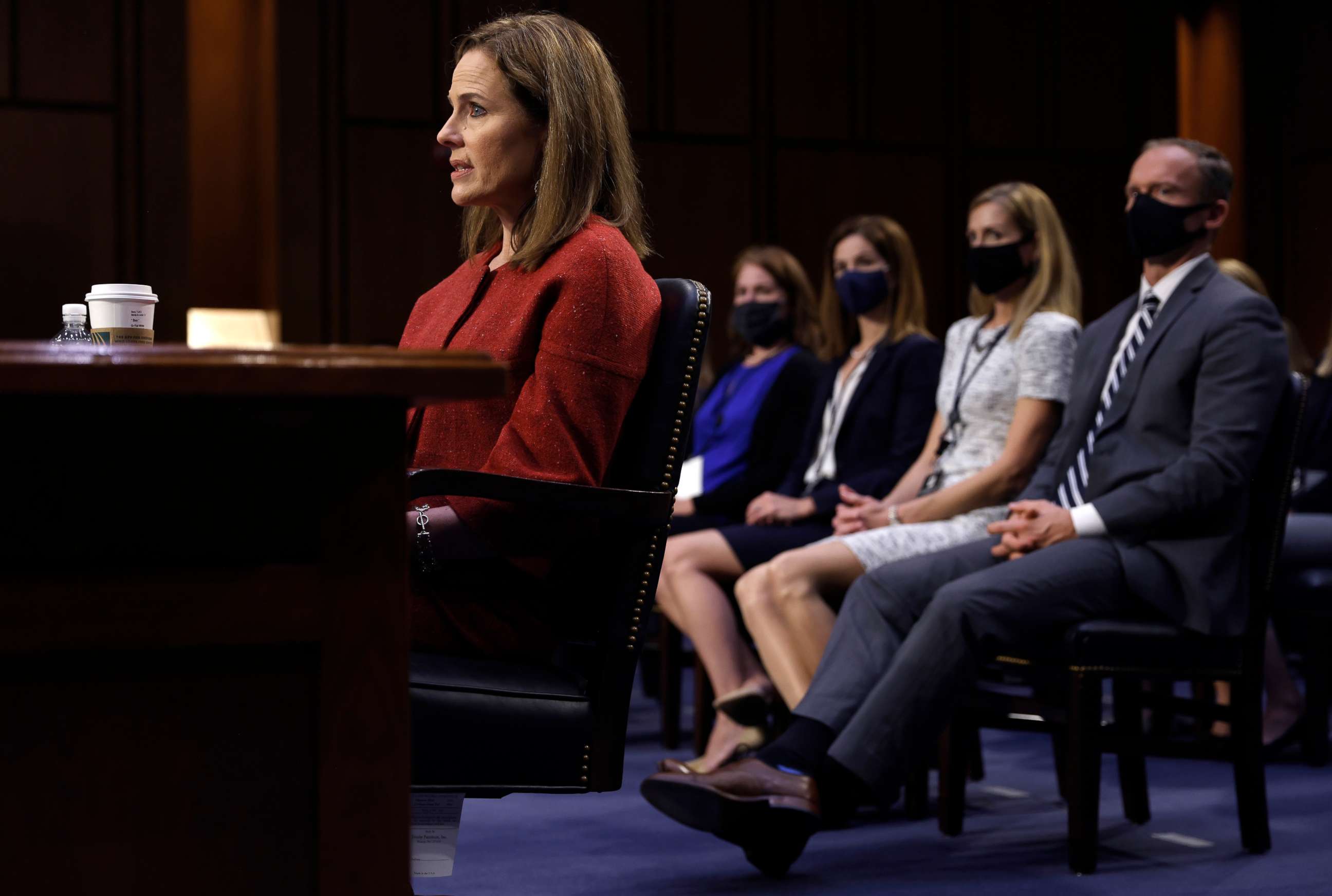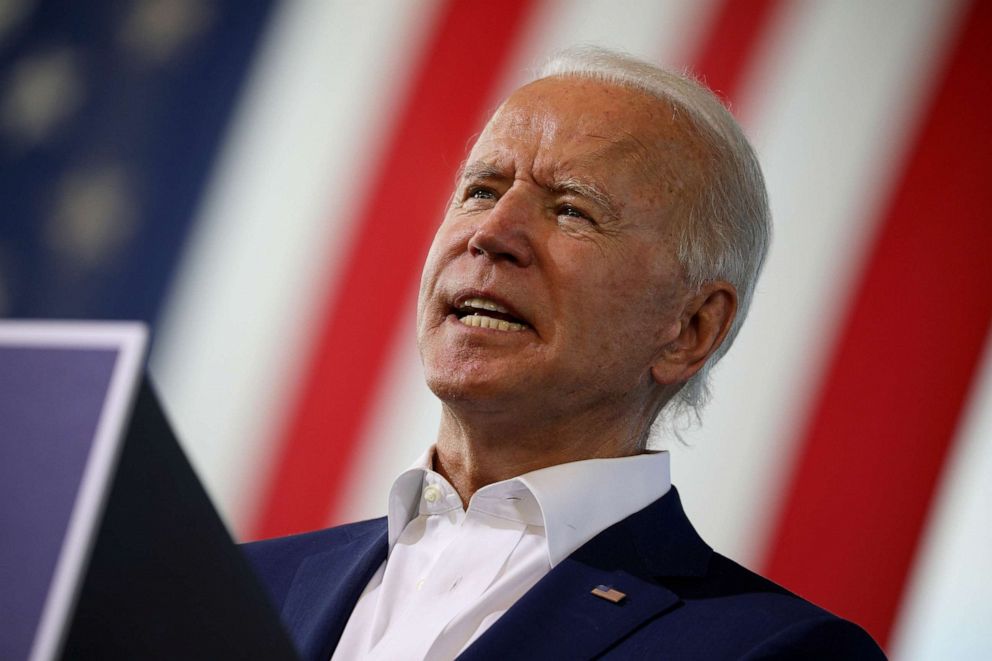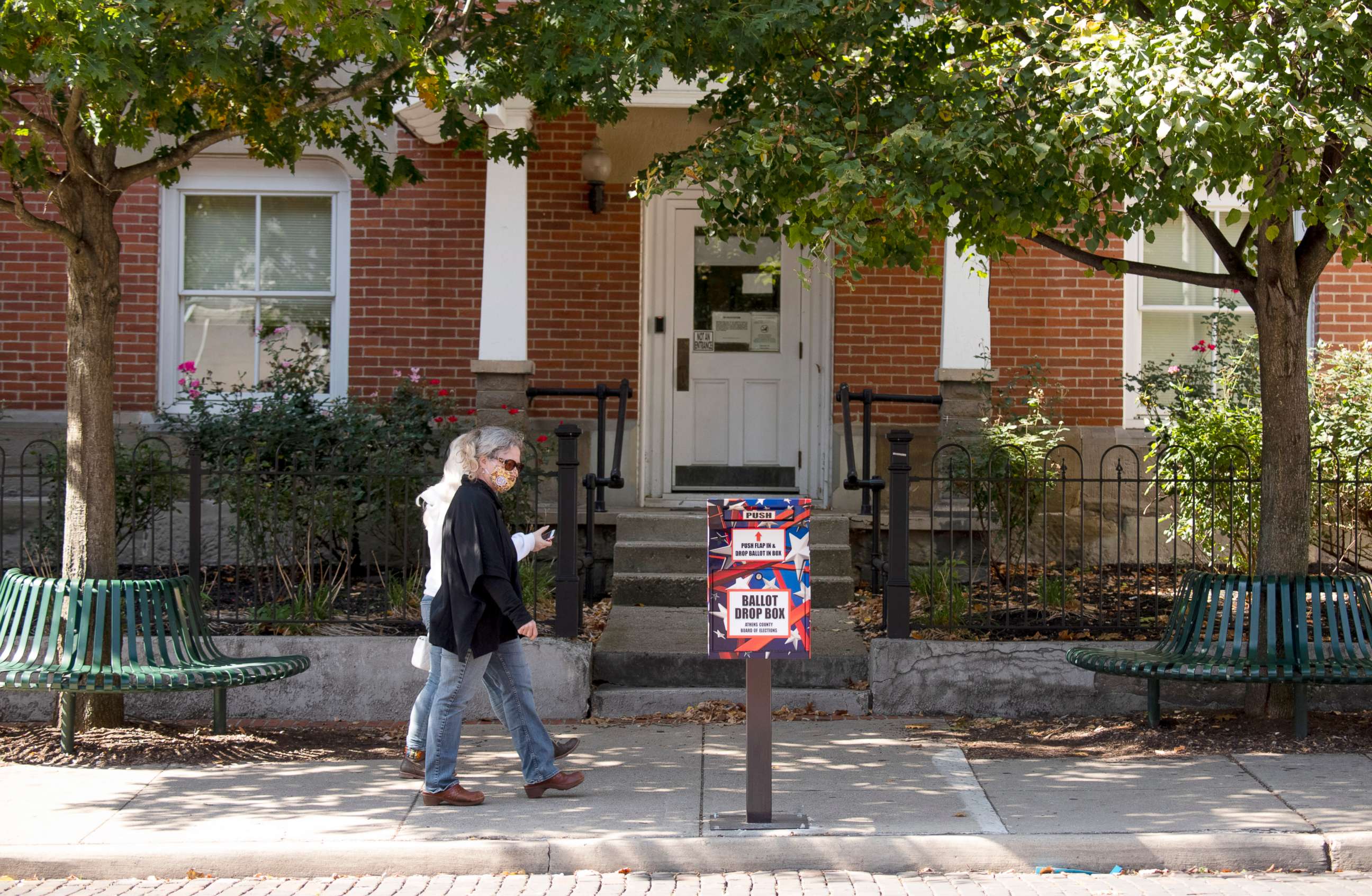The Note: Road to Senate majority could run through SCOTUS hearings
The hearings are unlikely to change senators' minds, but could change voters'.
The TAKE with Rick Klein
It's not about the votes in the room -- virtual or otherwise -- or even the votes in the Senate as a whole.
This week's hearings for Judge Amy Coney Barrett are odd in at least one respect: They appear unlikely to influence the decision of a single senator when it comes time to vote on her confirmation for the Supreme Court.
But the hearings could matter a great deal when it comes to determining who will sit in similar rooms next year and beyond. Four potentially vulnerable Republican senators sit on the Senate Judiciary Committee on the eve of elections that look increasingly dire for their party.
That list includes Chairman Lindsey Graham, R-S.C., who opened Tuesday's hearing with a riff about how Obamacare has been a "disaster" that he argued is laying the groundwork for Democrats to impose a single-payer system.

"That's a political debate we're involved in," said Graham, in what he acknowledged wasn't actually a question to Barrett.
Democrats on the committee include Sen. Kamala Harris, the Democratic nominee for vice president, along with a range of potential Biden administration Cabinet picks. Their goal for the week is less about changing colleagues' minds than it is highlighting what a conservative-leaning court could mean for matters of policy.
To that end, Barrett said repeatedly that she has no predetermined position on the Trump administration's challenge to the Affordable Care Act -- a case scheduled to go in front of the Supreme Court just days after the election.
Barrett also said she would "consider" recusing herself from a case that arises from a dispute in the election.
And in one striking exchange, her care in not prejudging outcomes left her declining to say whether the president has any right under the Constitution to delay an election -- a power he clearly does not have.
The RUNDOWN with MaryAlice Parks
In hoping not to distract, Democrats did just that.
For days, former Vice President Joe Biden made clear he did not want to answer questions about the hypothetical idea of working with Congress to add seats to the Supreme Court should he win in November and Democrats take the Senate. He wanted instead to keep the focus on the way Republicans are currently working at lightning speed to rush the confirmation of Barrett.
"I'm not a fan of court packing," Biden said Tuesday. "What I want them to focus on is the packing -- court packing is going on now. Never before, when an election has already begun and millions of votes already cast, has it ever been that a Supreme Court nominee was put forward. Had never happened before."

But Biden and his campaign seemed to make sure the questions kept coming. And Republicans piled on as they, of course, liked anything that turned attention away from the extreme flip-flopping and rule-breaking they engaged in to put their picks on the court.
Tuesday, one of Biden's closest confidants also tried to set the record straight and reminded reporters about President Barack Obama's Supreme Court nominee, who Senate Leader Mitch McConnell successfully denied by just refusing to bring up his confirmation for nearly nine months.
"My understanding of what former Vice President Biden said is that he is watching this process -- and he watched the process in which Merrick Garland was denied any hearing or any vote -- and (he) looks at that and says, 'the Republicans have played fast and loose with the rules in order to jam two partisan nominees onto the court that is the equivalent of packing the court with folks by coloring outside the lines,'" Sen. Chris Coons, D-Del., said.
The TIP with Benjamin Siegel
Americans are already voting early in Ohio and Texas, but that hasn't stopped the legal disputes over the use of absentee ballot drop boxes for voters to return their ballots.
In Texas, a federal three-judge panel has reinstated Gov. Greg Abbott's policy limiting each county to a single drop box, while the Sixth Circuit Court of Appeals has done the same for guidance in Ohio from Secretary of State Frank LaRose, a Republican who has argued that he is constrained by state law from allowing counties to install multiple drop-off sites for ballots.
Democrats and civil rights advocates who brought both cases argue that the limited number of drop boxes disenfranchises voters -- particularly in densely population areas like Harris County, Texas, where only one drop box will service millions of potential absentee voters.

And in California, Democratic Attorney General Xavier Becerra and Secretary of State Alex Padilla are warning Republicans to stop their use of unofficial ballot drop boxes in several counties, warning that county elections officials are the only entities that can deploy official drop boxes, even though it is legal to collect and turn in other voters' ballots.
The continued fight over drop boxes -- a well-regarded mainstay in Western states like Colorado, Utah and Oregon that are now in use in dozens of states as a result of pandemic-related changes to voting -- could add more confusion and chaos to the election.
THE PLAYLIST
ABC News' "Start Here" podcast Wednesday morning’s episode features ABC News Senior Washington reporter Devin Dwyer, who recaps the first day of questioning in Justice Amy Coney Barrett’s Supreme Court confirmation hearing. ABC News’ Stephanie Ramos discusses the pausing of two COVID-19 vaccine and treatment trials. And ABC News Senior Investigative reporter Matthew Mosk explains why the Trump campaign is training an "army" of poll watchers for Election Day. http://apple.co/2HPocUL
ABC News' "Powerhouse Politics" podcast. Stuart Stevens, a senior adviser with the Lincoln Project and author of "It Was All A Lie: How The Republican Party Became Donald Trump," joins ABC News' Chief White House Correspondent Jonathan Karl and Political Director Rick Klein on the "Powerhouse Politics" podcast. https://bit.ly/3jXffaT
WHAT YOU NEED TO KNOW TODAY
- The Senate Judiciary Committee will continue to hold hearings on the nomination of Judge Amy Coney Barrett to be an associate justice on the Supreme Court. The hearing begins at 9 a.m. and the hearings will be live-streamed on ABC News Live.
- The Supreme Court will hear oral arguments in two cases beginning at 10 a.m.
- President Donald Trump will deliver remarks to the Economic Clubs of New York, Florida, Washington, D.C., Chicago, Pittsburgh and Sheboygan at 11 a.m. He will later speak at a campaign rally in Des Moines, Iowa, at 6 p.m. CT.
- Vice President Mike Pence will host a campaign event in Grand Rapids, Michigan, at 12:30 p.m.
Download the ABC News app and select "The Note" as an item of interest to receive the day's sharpest political analysis.
The Note is a daily ABC News feature that highlights the day's top stories in politics. Please check back tomorrow for the latest.




